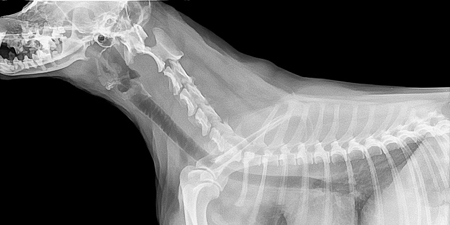- Navigation
- Home
- About
- » Meet Our Staff
- » Hospital Tour
- Services
- » Pet Wellness
- » Puppy and Kitten Care
- » Senior Pet Care
- » Pet Dental Care
- » Vaccinations
- » Microchip Implantation
- » Diagnostics Services
- » Pet Surgery
- » Pharmacy and Nutrition
- » Grooming
- » Boarding
- Resources
- » New Patient Info
- » Common Pet Health Issues
- » Canine Care Guide
- » Feline Care Guide
- » Pet Hospice and Euthanasia
- » Animal Rescue and Adoptions
- » Helpful Links
- News
- Contact
- » Schedule Appointment
- » Emergency
- » Request Prescription Refill
- Online Pharmacy
Diagnostic Services
Radiology (X-rays)
When it comes to treating your cat or dog, one of the most important tools at our disposal are digital x-rays. Digital technology allows us to examine and distribute images much more quickly and requires less radiation than conventional methods. Similar to the transition from film to digital photography, the use of digital imaging is a significant advancement in veterinary care, and we are proud to offer this service to our clients.
Laboratory
We maintains an in-house laboratory to provide you with test results quickly and efficiently. Our range of testing includes:
Heartworm testing
This important test requires a small blood sample from your pet and works by detecting the presence of heartworm proteins. Further tests may be ordered if a positive result is returned.
Blood chemistry panel
This is a series of tests that provides information about your pet’s internal organs and metabolic health. It is useful in screening for liver or kidney disease and to assess your pet’s current levels of sodium, potassium, and chloride.
Complete Blood Cell Count (CBC)
The CBC reveals the number and condition of your pet’s red blood cells, white blood cells, and platelets. A CBC can be used to indicate anemia, infection, or issues with blood clotting.
Stool analysis
Examining your pet’s stool helps to identify parasites such as roundworms, hookworms, and tapeworms.
Urine analysis
With only a small sample, we can learn much about your pet’s kidney function and look for evidence of a urinary tract infection or diabetes. This test is often performed along with a CBC and blood chemistry panel to provide a complete picture of your pet’s overall health.
Feline leukemia virus (FeLV)
This disease can be diagnosed by conducting a simple blood test called an ELISA, which identifies FeLV proteins in the blood. This test is highly sensitive and can identify infections at a very early stage.
Feline immunodeficiency virus (FIV)
An FIV infection is often diagnosed by a blood test, which looks for the presence of antibodies. Your veterinarian will interpret the test result and determine whether additional testing is required.
Call (205) 621-5755 to schedule an appointment
91 Weatherly Club Dr, Alabaster, AL 35007, info@weatherlyvets.com
Copyright © 2025 - Weatherly Animal Hospital

